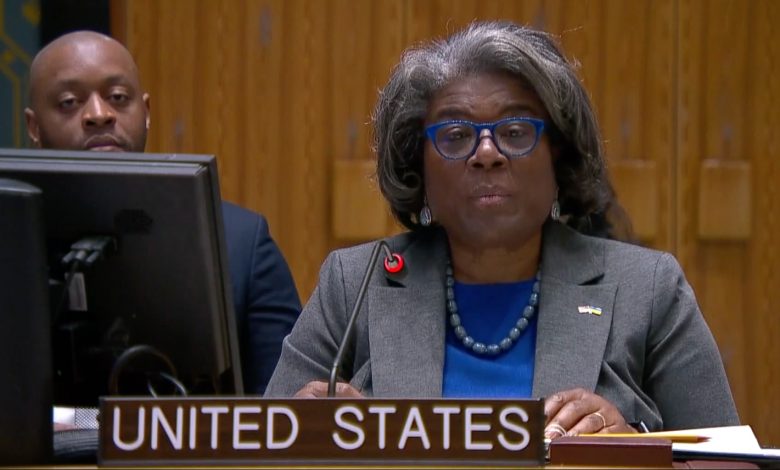Remarks by Ambassador Linda Thomas-Greenfield at a UN Security Council briefing on Somalia

Ambassador Linda Thomas-Greenfield
US Representative to the United Nations
New-York, New-York
February 22, 2023
AS DELIVERED
Thank you, Madam President. And let me thank Deputy Special Representative Gbeho, Special Representative Souef and Executive Director Ms. Bahous for your briefings and insightful presentations today. I would also like to welcome the presence of the Somali PR in the room today.
Last month I had the opportunity to visit Somalia to review the humanitarian, stability and security situation. And I would like to thank Ms. Gbeho for her support during my mission, as well as Special Envoy Souef, who I met there.
Let me start with safety and some good news. Thanks to the bravery of Somali security forces and citizens, over 70 towns in Hirshabelle and Galmudug have been liberated from brutal al-Shabaab rule since last summer.
Unfortunately, lives were lost in the process. We mourn the Somali people who were killed in the struggle to liberate their country from terrorism, as did the Deputy Commander of the Danab, Major Hassan Tuure. His sacrifice, and that of others like him, reaffirms the US commitment to support Somali-led efforts to defeat al-Shabaab and bring security to the people of Somalia.
We therefore welcome the recent pledge by Somalia and its neighbors to further expand operations against al-Shabaab into southern Somalia. And we strongly support and call on other international partners to help meet the troop deployment needs in Somalia. Stability, which is of course directly linked to security, remains a challenge in Somalia. Timely and balanced stabilization measures in newly liberated areas are essential to bring security and relief to the Somali people in those areas.
UNSOM plays a critical role in assisting the federal government of Somalia in planning and coordinating stabilization efforts in response to operations. We appreciate UNSOM’s efforts to continue to emphasize the need for long-term security sector reform, rule of law security approaches and good governance. These efforts will pave the way for lasting peace and security in Somalia.
We continue to support the federal government’s declared goal of ending ATMIS by the end of 2024. We expect the disengagement plans to be coordinated with Somali officials in line with Somali security priorities on the ground. But ATMIS has played a key role in ongoing Somalia-led operations against al-Shabaab. In the meantime, we call on ATMIS to continue to provide the necessary support in close cooperation with our Somali partners.
The United States also welcomes advances toward federalism and political reconciliation. We congratulate the federal government and the states that have agreed on the national security architecture and a national judicial framework. We also welcome the agreement reached on the general and presidential elections in the state of South West.
But we remain very concerned about the violence in Laascaanood, particularly the indiscriminate shelling of civilians. We call for an immediate de-escalation of violence, protection of civilians, unhindered humanitarian access and the peaceful resolution of tensions through dialogue.
Finally, I would like to talk about the drought – and the potential for renewed famine in Somalia. Famine is the ultimate failure of the international community. In a world of food abundance, entire communities should never starve. This Council cannot sit here and accept this failure.
Since 2022, the United States has provided more than $2.5 billion in life-saving assistance in the Horn of Africa — $1.3 billion of which went directly to Somalia. Our funding over the past year covered more than 80 percent of the World Food Program’s emergency response efforts in the region. We delayed the start of the famine. But it was just a delay.
On my recent trip to Mogadishu, I announced that the United States would provide an additional $40 million to Somalia. This funding will close extreme nutritional gaps and fight outbreaks of deadly diseases.
But from this April, the risk of famine will return. According to the UN, without contributions from other donors, essential food and nutritional assistance for 4.6 million people in Somalia will end in April. We all just heard the call from Ms Gbeho.
And I made it clear in Somalia, and I will make it clear to all of you here, that the United States cannot continue to do this alone. This is a collective responsibility. I call on the international community – especially countries in the region and countries with the means to give more – to heed the call of humanity.
In the midst of this crisis, it was devastating to see some traditional donors cut their humanitarian aid budgets. We cannot cut or even maintain our aid budgets. We must increase our funds in the coming year. We need to turn this hunger shift into cancellation. And more countries must contribute to this. Giving to more countries, both bilaterally and multilaterally.
So today I appeal to all of you, my colleagues around the table. Let’s be ambitious. Let’s fight this famine. And let’s do it together. let’s save lives
Madam President, before I close, I would like to say that we remain focused on the situation in Türkiye and Syria, where they experienced another earthquake less than 24 hours ago. Let me offer my condolences at the devastation and loss of more lives.
Thank you Madam President.
###

